|
"MARX, KARL (+) GABRIEL DEVILLE (+) [TRANSLATOR:] CHRISTIAN RAKOVSKY (+) ED. BERNSTEIN (+) GEORGI PLEKHANOV
Kapitalutu. [i.e. Bulgarian ""Das Kapital""] [Bound with]: Predpostavkit na sotsializma i zadachitu na sotsialnata demokratsiya [i.e. Bulgarian: ""The Preconditions of Socialism and the Tasks of Social Democracy""] (+) Marksovata Istoricheska Teoria [i.e... - [FIRST BULGARIAN EDITION OF THE MOST IMPORTANT ABRIDGED VERSION OF ""THE CAPITAL""]
Varna, 1900. 8vo. In contemporary half calf with four raised bands to spine. Extremities with wear. Frontboard missing parts of cloth. Two bands on spine missing some of the leather. Verso of front free end paper with notes in contemporary hand and previous owner's name to title-page of all three works. A few occassional marginal lignings in pencil, otherwise internally good and clean. [Predpostavkit na sotsializma i zadachitu...:] XII, 257, (1), XIV pp. [Marksovata Istoricheska Teoria:] 86, (2) pp. [Kapitalutu:] IV, (5)-284 pp.
书商的参考编号 : 57116
|
|
|
"MARX, KARL (+) HAYDAR RIFAT (translator).
Sermaye. [i.e. Turkish: ""Das Kapital""]. - [FIRST TURKISH EDITION OF THE MOST IMPORTANT ABRIDGED VERSION OF ""THE CAPITAL""]
Istanbul, Sirketi Mürettibye Matbaasi, 1933. 8vo. In a recent full black leather binding with four raised bands and gilt lettering to spine and front board. Blindtooled frames to front and back board. A fine and clean copy. (7), (1), (5)-305, (1), [errata-leaf] pp.
书商的参考编号 : 59547
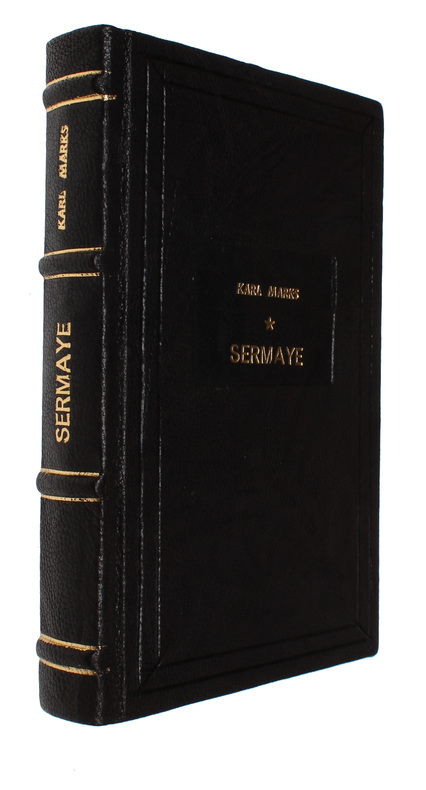
|
|
|
"MARX, KARL (+) HAYDAR RIFAT (translator).
Sermaye. [i.e. Turkish: ""Das Kapital""]. - [FIRST TURKISH EDITION OF THE MOST IMPORTANT ABRIDGED VERSION OF ""THE CAPITAL""]
Istanbul, Sirketi Mürettibye Matbaasi, 1933. 8vo. In contemporary full black cloth binding with gilt lettering to spine. Blindtooled frames to front and back board. Previous owner's name ""Hüsnû Hizlan"" in gilt lettering to front board. A fine and clean copy. (7), (1), (5)-305, (1), [errata-leaf] pp.
书商的参考编号 : 59614
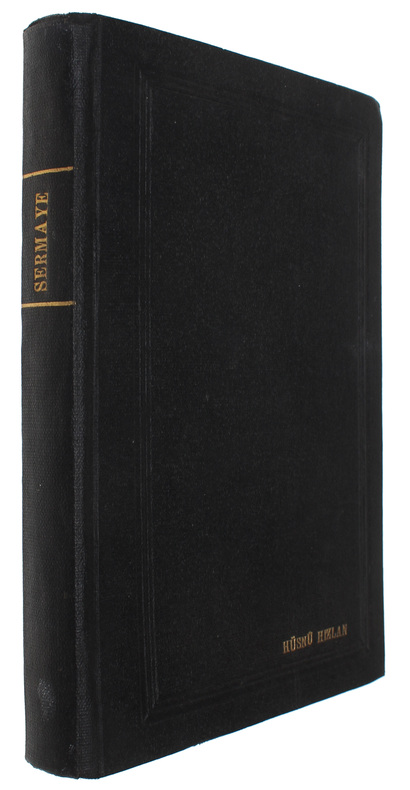
|
|
|
"MARX, KARL (FRIEDRICH ENGELS edt.).
Das Kapital. Kritik der politischen Oekonomie. Zweiter Band. Buch II: Der Cirkulationsprocess des Kapitals. Herausgeben von Friedrich Engels. - [""THE FORGOTTEN BOOK OF CAPITAL""]
Hamburg: Otto Meissner, 1885. 8vo. Very nice contemporary black half calf with gilt spine. A bit of wear to extremitoes. Inner front hinge a little weak. Title-page a littel dusty, but otherwise very nice and clean. Book-plate (Arnold Heertje) to inside of front board. XXVII, (1), 526 pp. + 1 f. With pp. 515-16 in the first state (""Consumtionsfonds"" with a C) and with the imprint-leaf at the end.
书商的参考编号 : 57044

|
|
|
"MARX, KARL [Translated by:] P. RUMYANTSEV [Edited by:] A.MANUILOV.
Kritika nekotorykh polozhenii politicheskoi ekonomii. (i.e.: ""Zur Kritik der Politischen Oekonomie"", i.e.: ""A Contribution to the Critique of Political Economy"". - [FIRST RUSSIAN TRANSLATION OF THE BLUEPRINT FOR ""DAS KAPITAL"" ]
Moscow, Izdanie Vladimira Bonch-Bruevicha, 1896. 8vo. In a later modest black half calf binding with marbled boards. Traces of stamp to verso of front and back board. Title-page slightly rubbed. Occassional underlignings in text and margins. Pp. 145-146 reinforced in margin. Otherwise a fine copy. XII, (4), (1)-160 pp.
书商的参考编号 : 59587
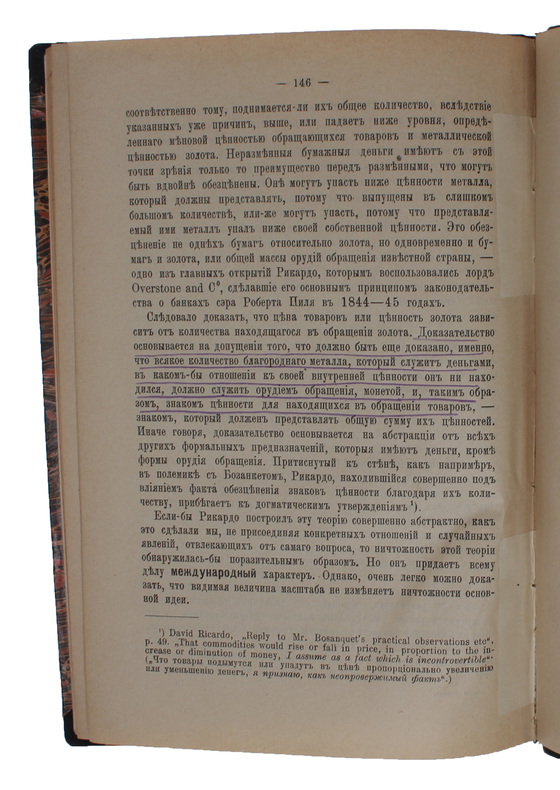
|
|
|
"MARX, KARL.
Capital. I. - The Serfdom of Work. II. - The Lordship of Wealth. [In ""To-Day: A Monthly Gathering of Bold Thoughts. Vol. I. May - September, 1883]. - [THE FIRST BRITISH TRANSLATION OF ANY PART OF ""DAS KAPITAL""]
London, The Modern Press, 1883. Royal8vo. Entire volume present, in the original olive green full cloth binding with gilt lettering to spine. Front board with black line-borders, black vignette, gilt lettering and gilt ornamentation depicting the sun. Spine with small mark and professional repairs to head and tail of spine. Light occassional brownspots to first leaves, otherwise a fine and clean copy. (Capital:) Pp. 57-68" 145-150. (Entire volume:) IV, 600 pp. Housed in a cloth clamshell box with gilt lettering to spine.
书商的参考编号 : 60072
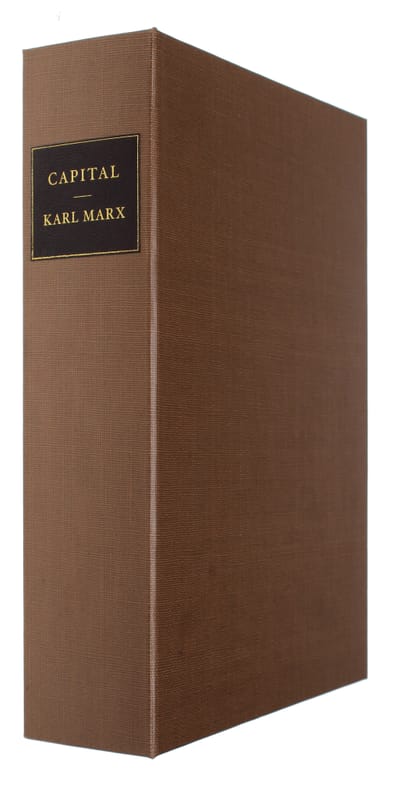
|
|
|
"MARX, KARL.
Das Kapital. Kritik der politischen Oekonomie. Erster Band. Buch I: Der Produktionsprocess des Kapitals. - [THE NEW RELIGION - PMM 359]
Hamburg, Otto Meisner, 1867. 8vo. Nice contemporary black half calf with gilt spine. Minor wear to hinges and capitals, which have tiny, barely noticeable professional restorations. Inner hinges re-enforced. Contemporary owner's names (Emil Kirchner and Karl Kirchner (1887)) to front free end-paper. Contemporary book-plate to inside of front board (Ernst Ferdinand Kirchner). A very nice copy with just the slightest of occasional brownspotting. Housed in a very nice custom-made black full morocco box with gilt llettering to spine. XII, 784 pp.
书商的参考编号 : 56311
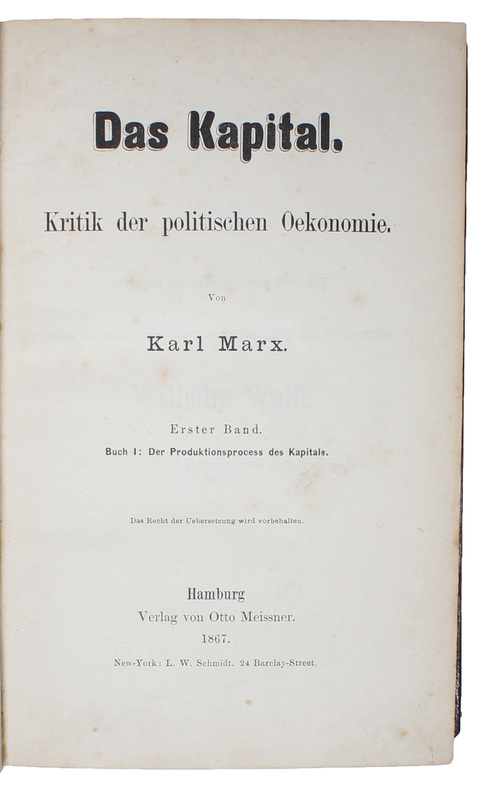
|
|
|
"MARX, KARL.
Der 18the Brumaire des Louis Napoleon [in: Die Revolution, eine Zeitschrift in zwanglosen Heften. Herausgegeben von J. Weydemeyer. Erstes Heft]. - [THE MOST IMPORTANT PROPOSITIONS IN THE MARXIST TEACHING ON THE STATE]
New-York, 1852. Bound in a later (ab. 1900) red full cloth binding with silver lettering to front board. A bit of wear to capitals, corners, and extremities. Front free end-paper with small repairs and strengthening. A couple of closed tears to blank outer margin of title-page (no loss and not affecting printing)Inner blank margins of the first few leaves strengthened (far from affecting text). Occasionally a few marginal notes. and underlinings. A near contemporary notice in Russian about the work has been inserted between the title-page and the preface. All in all a good copy with no major flaws. IV, (4), 62 pp.
书商的参考编号 : 58600
|
|
|
"MARX, KARL.
Haq-qâpîtâl: bîqqôret hak-kalkala ham-medînît, [ha-Kapital: bikoret ha-kalkalah ha-medinit], [hakapital], [i.e. Hebrew ""Das Kapital""]. 2 vols. - [FIRST HEBREW TRANSLATION OF 'DAS KAPITAL']
Yerûsalayim [Jerusalem], Sifriyyat Pôalîm, 1947 & 1954. Large8vo. Two volumes both in publisher's original printed cloth with the original dust-jackets. 763 pp."" 516 pp.Vol. 1: A bit of misolocured to spine and front board. Front dust-jacket detached from the spine and back-part. Spine lacking a third of the paper. Very fragile.Vol. 2: Upper and lower part of spine miscoloured. Dust-jacket missing upper and lower part of spine. Both volumes internally very fine and clean.
书商的参考编号 : 56712
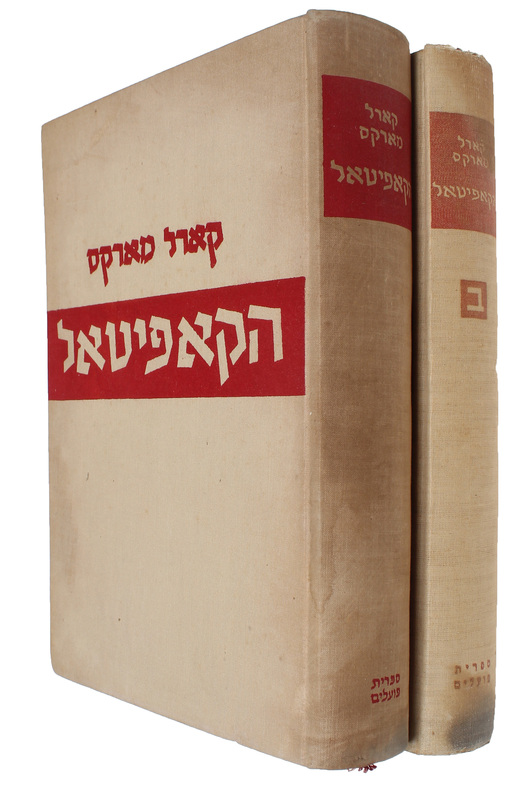
|
|
|
"MARX, KARL.
Herr Vogt. - [MARX' STRUGGLE AGAINST DEFAMATION ]
London, 1860. 8vo. Bound partly uncut with the original wrappers in a nice recent half calf pastiche binding with four rasied bands and gilt lettering to spine. Front wrapper with marginal repairs and back wrappers with repairs with minor loss of text. Light brownspotting to first and last leaves. A fine copy. VI, (2), (1)-191, (1, -errata) pp.
书商的参考编号 : 56420
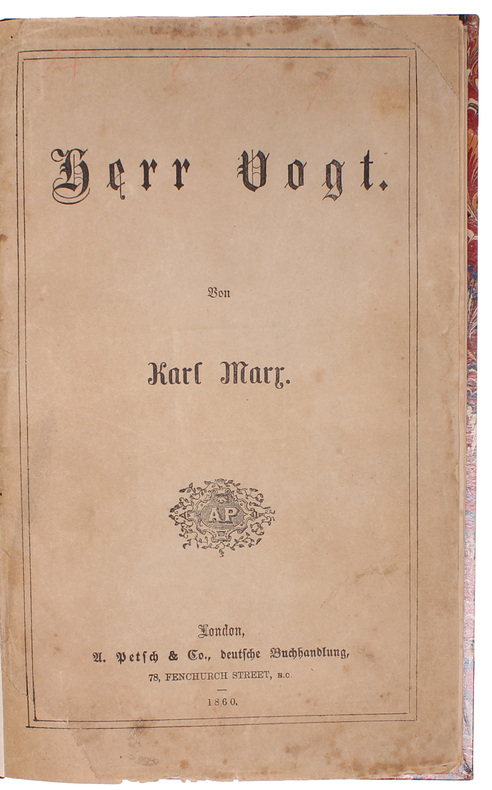
|
|
|
"MARX, KARL.
Kapitaal en Arbeid. Bewerkt door F. Domela Nieuwenhuis. - [THE RARE FIRST DUTCH TRANSLATION]
The Hague, Liebers & Co, (1881). 8vo. Uncut in the original printed wrappers. Spine missing some of the paper and upper part of front wrapper and lower part of back wrappers detached. Wrappers brownspotted and previous owner's name in pencil to upper margin of front wrapper. Pp. 37-40 missing some of the paper in upper margin - far from affecting text, otherwise internally fine and clean. VII, 82 pp.
书商的参考编号 : 60211
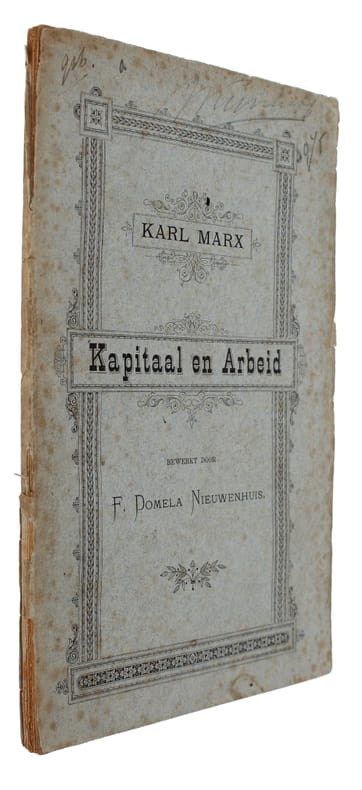
|
|
|
"MARX, KARL.
Kapital. Kritika politicheskoj ekonomii. Perevod c nmetskago. Tom pervoej. Kniga I. Protschess proizvodstva Kapitala. (Russian, = The Capital. Critique of the Political Economy. Translated from German. Volume One. Book I [all].). - [FIRST TRANSLATION INTO ANY LANGUAGE OF ""THE BIBLE OF MARXISM""]
S.-Peterburg, N.I. Poliakov, 1872. Large 8vo. In a nice recent half calf binding with gilt lettering to spine and five raised bands. First few leaves with light soling and a closed tear and a few marginal repairs to title-page. pp. 11-18 with repairs to upper outer corner. Closed tears to last leaf, otherwise a fine copy. XIII, (3), 678 pp. (wanting the half-title).
书商的参考编号 : 60281
|
|
|
"MARX, KARL.
Kapital. Krytyka ekonomji politycznej. Tom I. Ksiega pierwsza. Przebieg wytwarzani kapitalu.
Warszawa [Warsaw], Nakladem Spóldzielni Ksiegarskiej ""Ksiazka"", [1933] (1926 printed on title-page) Large8vo. In contemporary full blind-stamped cloth. Wear to extremities. Hindges a bit weak. (4), XXXVII, (1), 5-905, (5) pp.
书商的参考编号 : 57816
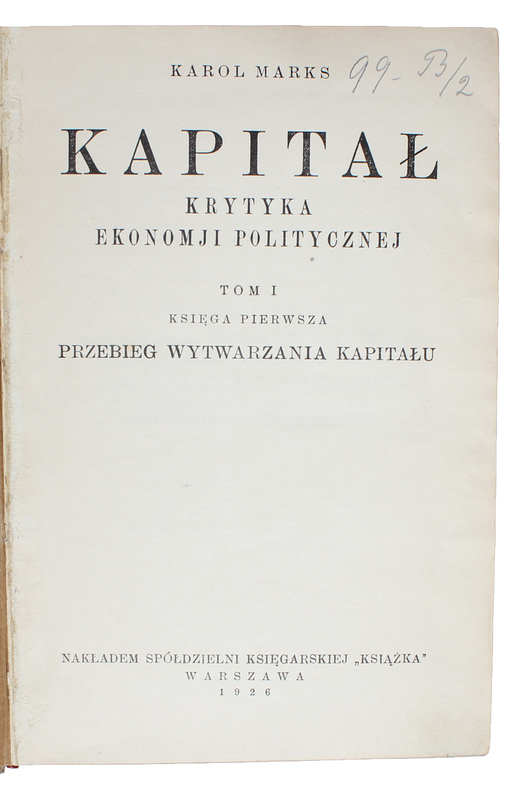
|
|
|
"MARX, KARL.
Kapital. Poliitilise Ökonoomia Kriitika [i.e. German ""Das Kapital""]. - [FIRST ESTONIAN TRANSLATION OF MARX'S 'DAS KAPITAL']
Tallinn, Kirjastusühing ""Soprus"", 1936 4to. In contemporary half calf with gilt lettering to spine. Extremities with light wear and corners bumped. Housed in a nice full black cloth clamshell box with black leather title-label to spine with lettering in silver. Otherwise fine and clean. (8), 9-43, (3), 640 pp.
书商的参考编号 : 59261
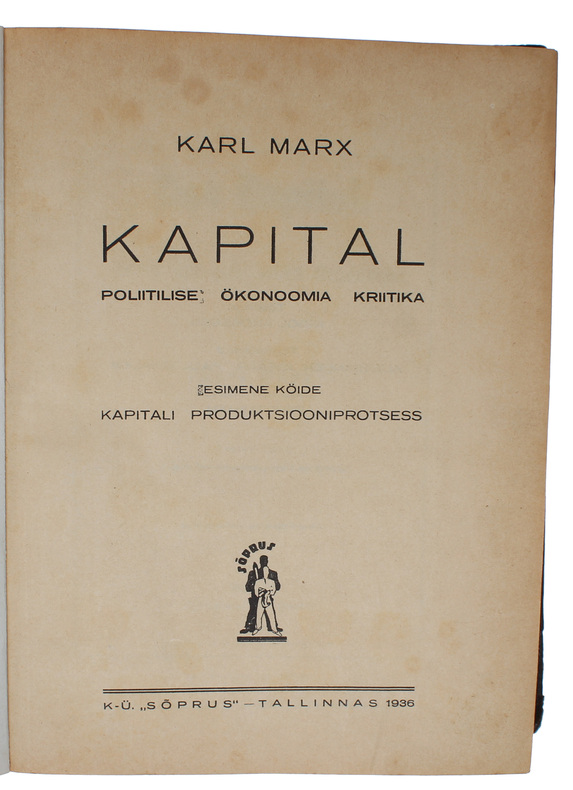
|
|
|
"MARX, KARL.
Kapital: k'aghak'atntesut'yan k'nnadatut'yun [Armenian i.e. ""Das Kapital""]. 4. vols. - [FIRST ARMENIAN TRANSLATION OF 'DAS KAPITAL']
Erevan, Kusakts'akan Hratarakch'ut'yun, 1933 - 1949. Royal8vo. 4 volumes, all in the original red (in four different nuances) full cloth with embossed title to front boards and spine. Light soiling to extremities on all four volumes expecially volume 1 with heavy soiling. Hindges a bit weak. All volumes internally fine and clean. XL,745, (3) pp." XXVII, 492, (4) pp. XXVI, 452 pp." (4), 452 pp.
书商的参考编号 : 54792

|
|
|
"MARX, KARL.
Kapitalen (i.e. Norwegian: ""Das Kapital""). - [FIRST NORWEGIAN TRANSLATION OF MARX'S 'DAS KAPITAL']
Oslo, Fram Forlag, 1930 - 1931. 5 parts (all). 8vo. 5 part in publisher's original 3 full cloth bindings with title and author in black lettering to front boards and spines. Spines lightly miscoloured, otherwise fine and clean. 166 pp."144 pp. 237 pp.
书商的参考编号 : 60005
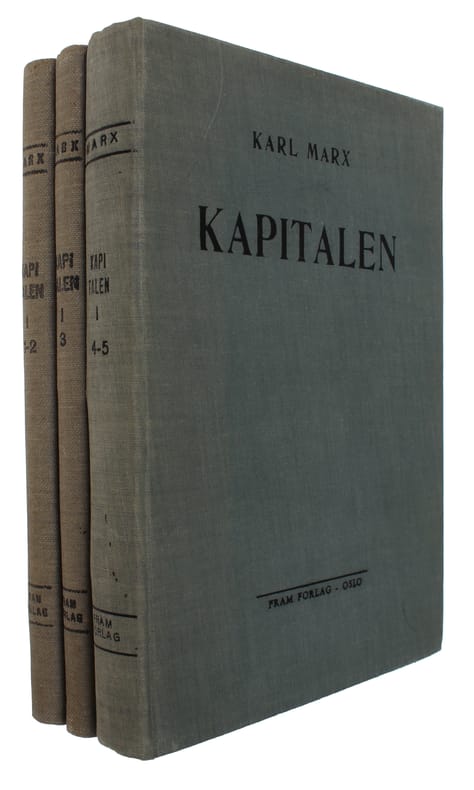
|
|
|
"MARX, KARL.
Kapitalen. 2 Dele. Første Bind. Kapitalens Produktionsproces. Oversat efter Originalens tredje Oplag. 2. Kapitalens Cirkulationsproces.Udgivet efter Forfatterens Død af Friedrich Engels. [i.e. Danish ""Das Kapital""]. - [FIRST DANISH TRANSLATION OF ""THE CAPITAL""]
København, (Copenhagen), 1885-87. 4to. In contemporary half cloth with gilt lettering to spine. Even browning as usual, due to the paper quality. An envelope pasted on to front free end-paper containing Danish articles on Marx. Previous owner's name to title-pages. A fine and clean copy with both half-titles present (""Socialistisk Bibliotek"" Vol. IV-V). Vol 1: (2), 473, (1)" Vol 2: VII-1" (4), 363, (1) pp.
书商的参考编号 : 55207
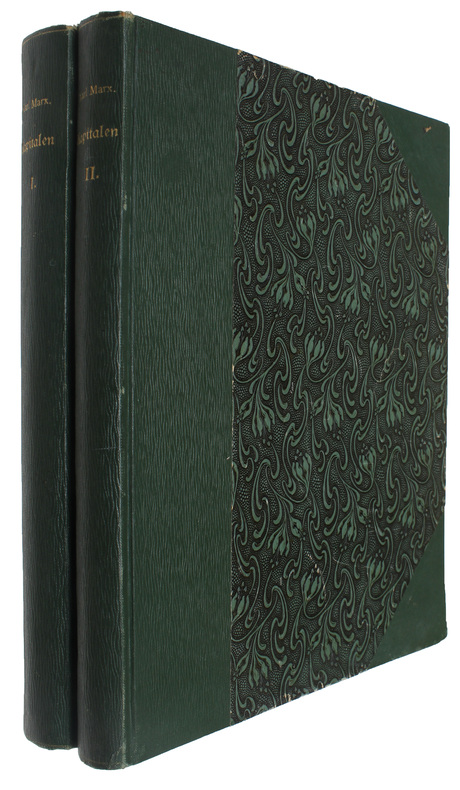
|
|
|
"MARX, KARL.
Kapitalet. Kritik av den politiska ekonomin. I svensk oversättning av Rickard Sandler. 3 vols. - [FIRST SWEDISH EDITION OF MARX' ""CAPITAL""]
Stockholm, Tidens Förlag, 1930-31. 8vo. Three volumes, all in the original publisher's uniform half calf bindings with gilt lettering to spines. Extremities, especially capitals, with a bit of wear. Internally very fine and clean. XXII, (2), 740" XXIII, (1), 479, (1)" XXV,(1), 836, (2) pp.
书商的参考编号 : 59980
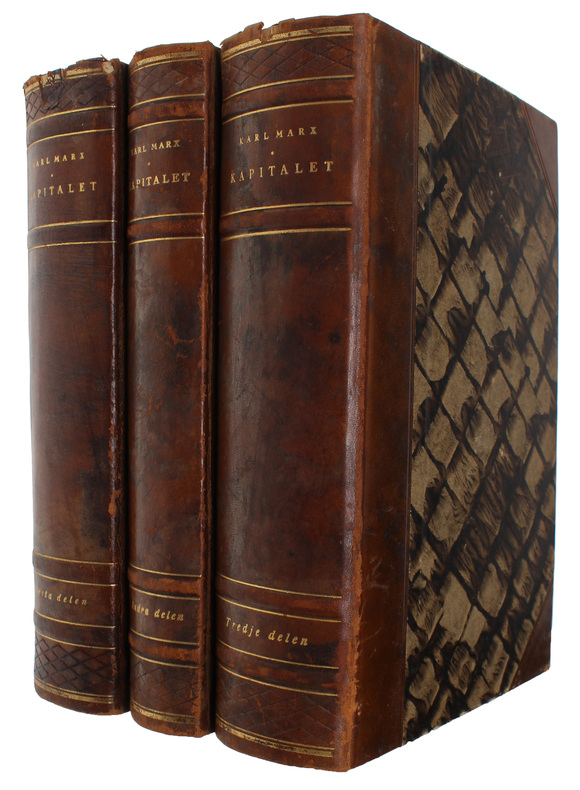
|
|
|
"MARX, KARL.
Kapitalut. Kritika na politicheskata ekonomiia. [i.e. Bulgarian ""Das Kapital""]. [Translated by Georgi Bakalov]. - [FIRST FULL BULGARIAN TRANSLATION OF MARX'S 'DAS KAPITAL']
Stara Sagora, 1910. 8vo. Contemporary half cloth with gilt lettering to spine. Spine with wear. Upper inner corner of title-page with repair, missing the 'K' in 'Karl'. Two last leaves with marginal repairs, not affecting text. Light occassional brownspots throughtout. XXX, (2), 598, (2) pp. + frontiespiece of Marx.
书商的参考编号 : 56711
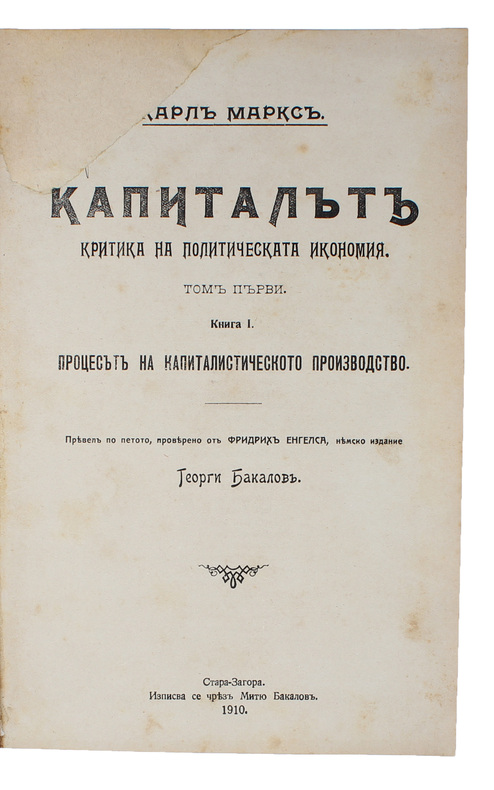
|
|
|
"MARX, KARL.
Kapitalut. Kritika na politicheskata ekonomiia. [i.e. Bulgarian ""Das Kapital""]. [Translated by Dimitar Blagoev] (+) Kapitalut. [Translated by Georgi Bakalov] (+) Karlu Marksu i Negovoto Vreme [i.e. Bulgarian: ""Karl Marx and his Time""]. - [THE FIRST BULGARIAN TRANSLATIONS OF MARX'S 'DAS KAPITAL']
[Blagoev-translation:] Sofia, [presumably 1910 but august 1909 stated on last leaf of preface] & [Ba [Blagoev-translation:] 8vo. In a contemporary full cloth binding with red leather title-label with gilt lettering to spine. Spine with wear and light soiling to extremities. Hindges a bit weak First 10 leaves with stain in margin, otherwise a good copy. (6), XXXI, (1), 675, (1) pp.{Bakalov-translation:] 8vo. In contemporary half calf with five raised bands and gilt lettering to spine. Wear to extremities and hindges a bit weak Repair to inner margin of title-page. Internally fine and clean. XXX, (2), 598, (2) pp. + frontiespiece of Marx. Withbound is ""Karl Marx and His Time"": (1)-180 pp.
书商的参考编号 : 57297
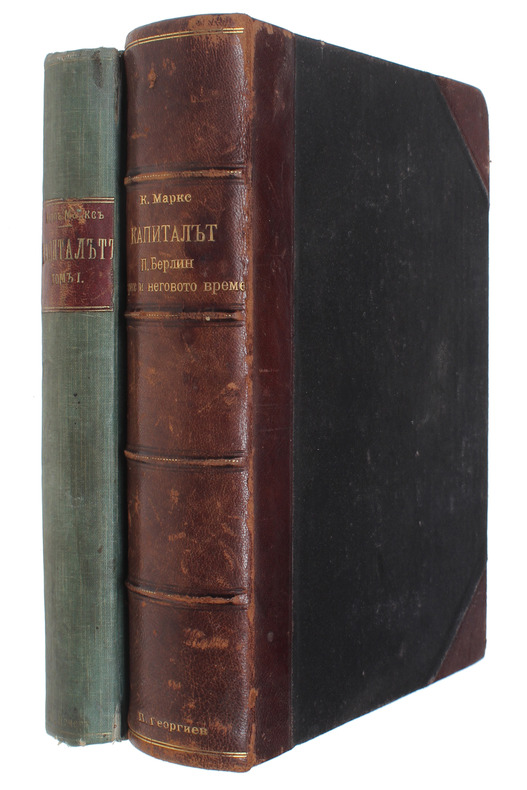
|
|
|
"MARX, KARL.
Kapitalut. Kritika na politicheskata ikonomiya. [i.e. Bulgarian ""Das Kapital""]. [Translated and introduction by Dimitar Blagoev] (+) Rech za svobodata na turgoviyata [i.e. Bulgarian: ""A speech on free trade""]. - [FIRST PARTIAL BULGARIAN TRANSLATION OF MARX'S 'DAS KAPITAL']
[Kapitalut:] Balchik, Izdanie na Krist'o Ivanov, 1905. [Speech On the Question of Free Trade:] Sofia 8vo. In contemporary red half calf. Extremities with wear. Previous owner's name in contemporary hand to upper part of both title-pages. Light browning throughout and a few occassional underlignings in text, mainly in ""A speech on free trade"". [Kapitalut:] XXXVIII, 122 pp. [Rech za...:] 27, (1).
书商的参考编号 : 58543
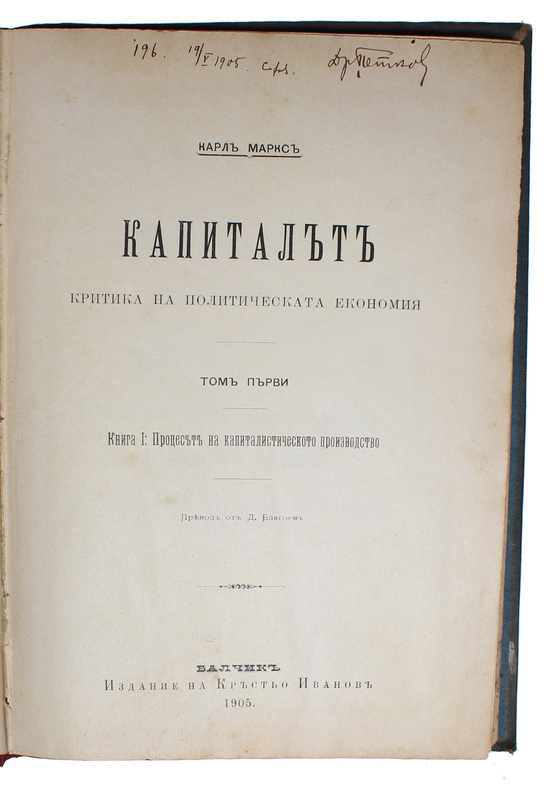
|
|
|
"MARX, KARL.
Marukusu shihonron. [i.e. Japanese ""Das Kapital""]. 5 vols. - [FIRST COMPLETE JAPANESE TRANSLATION OF MARX'S DAS KAPITAL]
Tokyo, Kaizosha, 1927-1928. Small4to. 5 volumes all in publisher's original full red cloth with gilt lettering to spine, all five volumes house the original slipcases. Free end-papers browned and only very light sporadic brownspots throughout. A very fine and clean copy.
书商的参考编号 : 56714
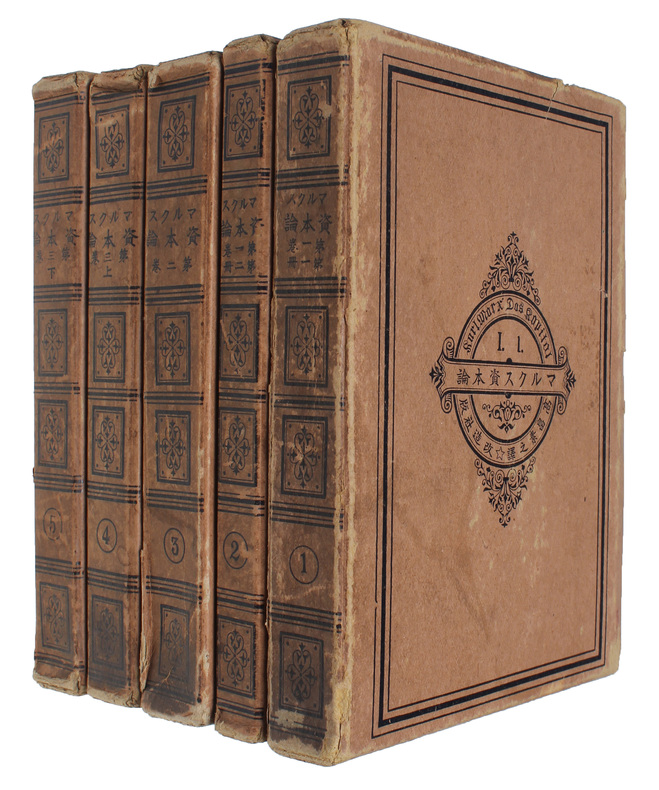
|
|
|
"MARX, KARL.
Pääoma. Kansantaloustieteen arvostelu Ensimäinen nide Ensimäinen kirja: Kapitalistinen tuotanto Alkuperäisen teoksen kuudennesta painoksesta suomentanut O. W. Louhivuori. (i.e. Finnish ""Das Kapital""). - [FIRST FINNISH TRANSLATION OF 'DAS KAPITAL']
Helsinki, Työväen Kirjapaino, 1918. 8vo. In publisher's original red cloth, with gilt lettering. Wear to extremities. Gilting on spine almost gone. Hindges very weak, book block almost detached from binding. Internally fine and clean. (4), XX, 712, (1), 79, (3) pp.
书商的参考编号 : 54737
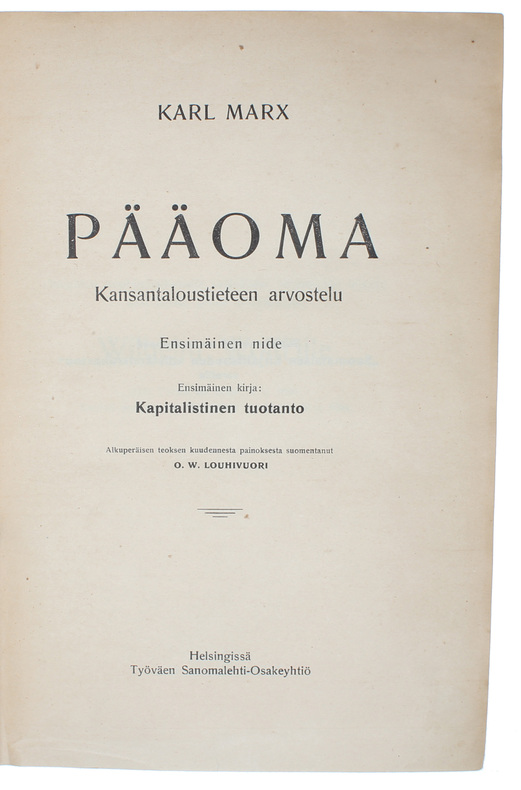
|
|
|
"MARX, KARL.
Walki klasowe we Francji 1848-1850 r. [i.e. English: ""The Class Struggles in France 1848-1850""].
Warszawa, Naklad Wincentego Raabego, 1907. 8vo. Uncut in the original printed wrappers. Wrappers with a few nicks and spine with three small holes. Internally fine and clean. (4), 182 pp.
书商的参考编号 : 55506
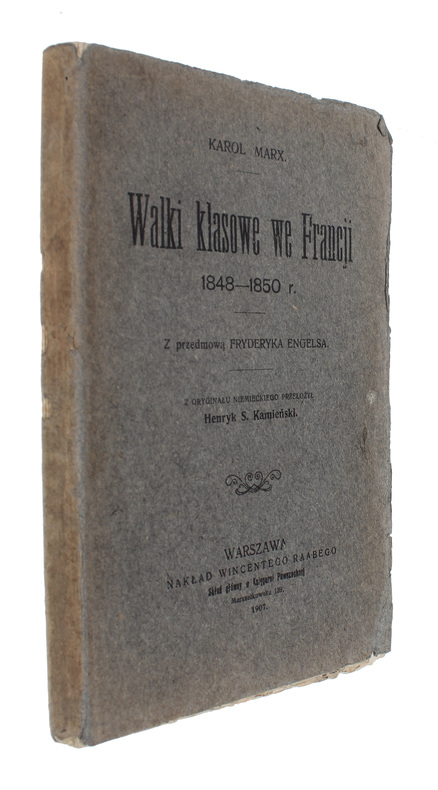
|
|
|
"MARX, KARL.
Zur Kritik der politischen Oekonomie. Erstes Heft [all that appeared]. - [THE BLUEPRINT FOR ""DAS KAPITAL"" - MAGNIFICENT ASSOCIATION-COPY]
Berlin, Franz Duncker, 1859. 8vo. Nice contemporary hafl calf with gilt lettering to spine. A bit of wear to extremities, markings after old label to front board and signs of vague damp staining to front board. A mostly faint damp stain to outer inner corner throrughout, but otherwise very nice. Title-page a bit dusty. Old library number (872) to front free end-paper and top of title-page and marginal pencil-annotations to a number of leaves. VIII, (2), 170 pp. Title-page with the ownership-signature of Alexander Appolonovich Manuilov to top of title-page and binding with his initials ""A. M."" in gold to the fot of spine.
书商的参考编号 : 58578
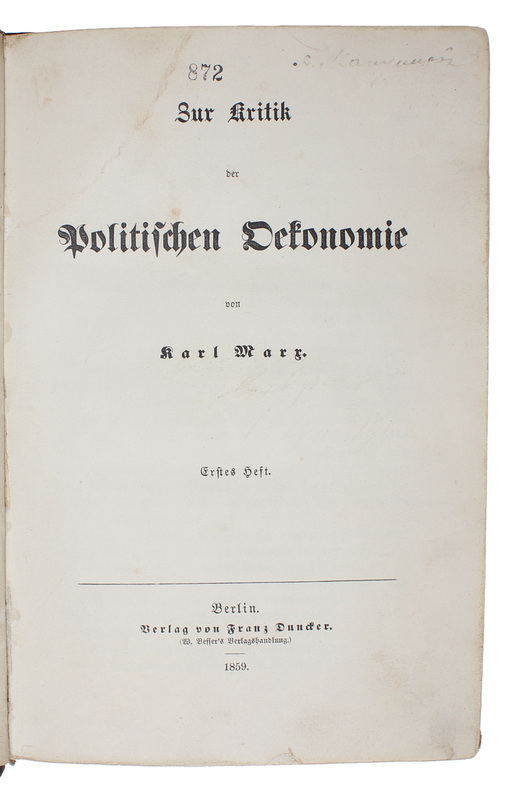
|
|
|
"MARX, KAROL (+) FRIEDRICH ENGELS.
Rewolucja i Kontrrewolucja w Niemczech. (Polish i.e. ""Revolution and Counter-Revolution in Germany""). [Bound with:] Nauki Ekonomiczne (+) Ustroj Socjalistyczny. - [FIRST POLISH TRANSLATION OF MARX'S ""REVOLUTION AND COUNTER-REVOLUTION""]
Warszawa, Bibljoteka Naukowa, 1906. Small4to. Bound in contemporary half calf with gilt lettering to spine with four raised bands. Stamp to title-pages and last leaf, otherwise fine. 277, (3), 154, (6), 51, (1) pp.
书商的参考编号 : 55908
|
|
|
"MARX, KAROL [KARL].
Kapital. Krytyka ekonomii politycznej. Tom Pierwszy. Ksiega I. Wytwarzanie kapitalu. - [FIRST POLISH EDITION OF THE BIBLE OF MARXISM]
[Weimar, Gustaf Uszman] for E.L. Kasprowicz, Lipsk [Leipzig], 1884-[89]. Large 4to. Bound in a very nice recent red half calf with five raised bands and gilt title to spine. Title-page with repair to inner margin and with a few closed tears. Outer margin discreetly reinforced. Verso of title-page with ""1942 D. 1513"" in pencil. Last leaf also with a couple of closed/repaired tears, with minor loss of text, and reinforced in margin. Apart from the nicely restored flaws to the first and last leaf, this is an excellent, very nice and clean copy. VII, 325, (1) pp.
书商的参考编号 : 60267

|
|
|
"Marx, Roland"
"L'ANGLETERRE DE 1945 A NOS JOURS. 2ème édition"
"" "F1253 ATTENTION EDITION DE 1996. BROCHE."
书商的参考编号 : "19D4D4339CCD"
|
|
|
"RUGE, ARNOLD (edt.) - KARL MARX.
Anekdota zur neuesten deutschen Philosophie und Publicistik von Bruno Bauer, Ludwig Feuerbach, Friedrich Köppen, Karl Nauwerk, Arnold Ruge und einigen Ungenannten. 2 bde. [(Marx): Bemerkungen über die neueste preußische Censurinstruction. Von einem Rh... - [DEFINING THE ESSENCE OF REASON AS FREEDOM - MARX' DEBUT ARTICLE]
Zürich & Winterthur, Literarischen Comptoirs, 1843. 8vo. Bound in one nice later half calf binding in contemporary style with gilt title and blindstamped ornamentation to spine. Faded inscription of ""Eigenthus des Literar. Museum"" to both title-pages and last leaf of bot volumes. Stamps of the same Litarary Museum to volume 1, at both title-page, last leaf and a few leaves inbetween. Neat pencil annotations to a few leaves of volume 1. Neatly washed and with a few tiny closed tears to second gathering. A small spot to lower blank margin of pp. 195-8 of vol. 1. Contents generally clean and crisp. All in all a evry nice copy. IV, 320 + IV, 288 pp. [Marx' paper: Vol. I, pp. 56-88].
书商的参考编号 : 58875

|
|
|
( Editions Champ Libre - Cinéma ) - Groucho Marx - Patrice Ricord dit Ricor.
Correspondance de Groucho Marx .
Editions Champ Libre 1981. In-8 broché oblong de 362 pages au format 21,5 x 12,5 cm. Couverture illustrée à rabats par Patrice Ricord dit Ricor, d'une caricature de Groucho Marx. Dos resté carré avec pâle auréole verticale tout du long. Plats et intérieur frais malgré. Bel état général. Réédition originale, traduite de l’américain par Claude Portail, aidé de Harry Mathews.
书商的参考编号 : 23074
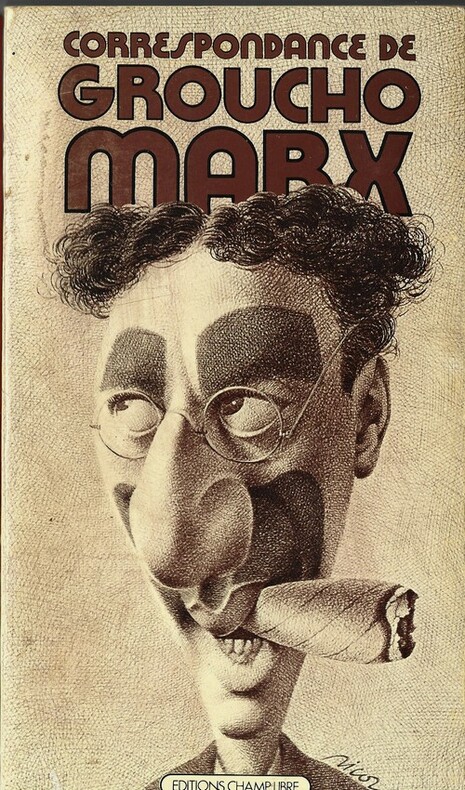
|
|
|
(BORUTTI Silvana) -
Il modo di produzione capitalistico in Marx.
Bologna, Zanichelli, 1980, 8vo (cm. 19 x 11,5) brossura con copertina illustrata a colori, pp. 137 (LF, 2) .

|
|
|
(HALTMEYER, Marx) (1588-1635) (& HUBER, Christian):
Beschreibung der Eidgnössischen Statt St. Gallen. Gelegenheit, Geschichten und Regiment. (Verfasst von Marx Huber). Wie auch des Lebens Hrn. D. von Watt, gewesenen Burgermeisters daselbst (von Christian Huber). 2 Teile in 1 Band.
S. Gallen, Jacob Redinger, M. DC. LXXXIII., (1683), kl. in-8vo, 1 Kupfer-Titel (gest. von Jeremias Renner. Titel: Historische Beschreibung der Statt Sanct Gallen) + 58 Bl., inkl. Titelbl. mit gestoch. herald. Vignette + Blatt 1+2 zu Vadian + 1 mehrfach gefalt. Kupfertafel (Panorama: Die Statt St. Gallen, gest. von H. Pfauw) + 722 S.; gest. Frontispiz-Porträt von ‘Joachimus Vadianus’ (von Watt) + 84 S. (inklus. Titelbl.) + 1 Bl. (Errata), stellenweise leicht gebräunt, hs. Besitzauftrag d. Zeit auf Vorsatz, zeitgen. Pergamentband, etwas gebräunt. Schönes Exemplar
书商的参考编号 : 122628aaf
|
|
|
(Kandel, Efim P. / Preiss, J.J.)
Marx und Engels über das reaktionäre Preussentum. [Hrsg.] Marx-Engels-Lenin-Institut, Moskau.
Moskau, Verlag für fremdsprachige Literatur, 1943. 8° (19,5 x 13 cm). 51 (2) S. Typographisch in Blau gestaltete Original-Broschur.
书商的参考编号 : 98780AB
|
|
|
(Marx / Engels / Mini-Buch) Duncker, Hermann
Über das Manifest der Kommunistischen Partei.
Verlag Tribüne, Berlin., 1983. 191 S. 16°, OPbd mit OSchuber.
书商的参考编号 : 26860

|
|
|
(MARX Jenny) / FEHRENBACH Jérôme
Jenny Marx. La tentation bourgeoise
Paris, Passés Composés, 2021, 14,5 x 22, 398-VIII pages sous couverture souple illustrée. Avec VIII pages d'illustrations noir & blanc et couleurs.
书商的参考编号 : HISTOALLEMAGN1122
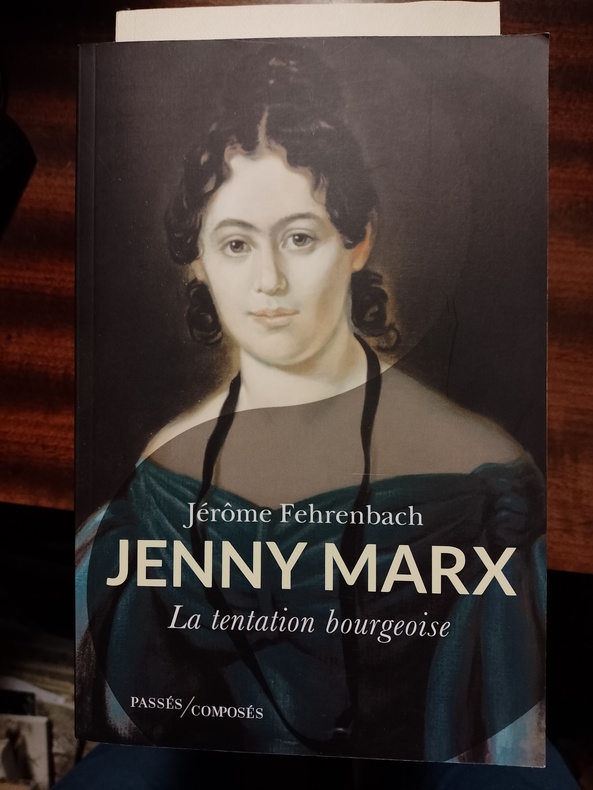
|
|
|
(MARX) - MANDEL Ernest
TRAITÉ D'ÉCONOMIE MARXISTE. Complet en 4 volumes.
1974 Paris, Union générale d'édition UGE, 10/18, 1974 et 1975. Quatre volumes au format de poche, brochés, d'environ 300 pp. chacun. Très bon état extérieur et intérieur. Sans annotations ni soulignements.
书商的参考编号 : 18258
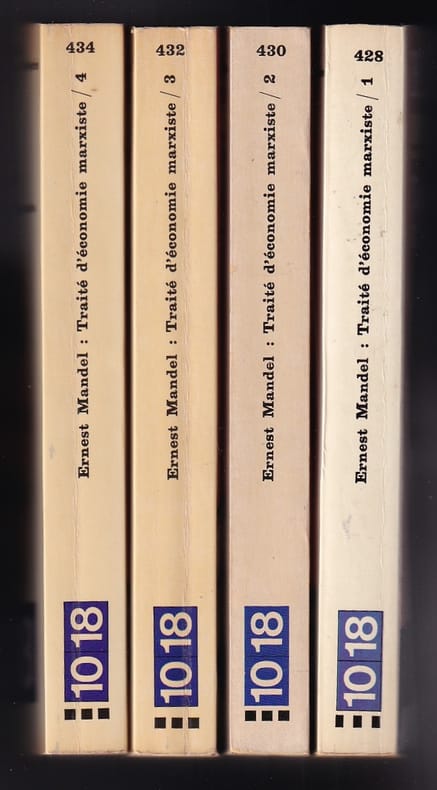
|
|
|
(MARX) CALVEZ (Jean-Yves)
La pensée de Karl Marx.
Paris, Seuil, Collection "Esprit", 1957. Fort volume in-8 broché, 664 pp. Critique de la religion et de la philosophie, la dialectique fondements de la science, du réel et de l'éthique, fin de l'aliénation et instauration de l'homme, le marxisme devant la critique.
书商的参考编号 : 5021
|
|
|
(MARX) SOMERHAUSEN (Luc)
L'humanisme agissant de Karl Marx.
Paris, Richard Masse Editeur, 1946. In-8 broché non coupé, XIV-291 pp. Illustrations en noir. Bel envoi de l'auteur "Pour Jean-Marie Andrieu hommage très affectueux, reconnaissant même pour avoir eu le courage de lire ce livre quand il était envore manuscrit, pour avoir eu la bonne grâce de s'y intéresser";
书商的参考编号 : 8786
|
|
|
(Mendjisky) Maurois, A. et al.
LES PEINTURES DE SERGE MENDJISKY, présentées par André Maurois, Marcel Pagnol, Claude-Roger Marx, Raymond Charmet.
Paris, Imprimerie Grou- Radenez 1963, in-4 (24,3 x 28,7 cm) relié toile Les photos noires ont été réalisées par Lucien Petitjean - Marc Vaux, les ektachromes sont dûs à Lucien Petitjean. La photogr avure a été réalisée dans les ateliers de la Sté Offset Poliveaux. Notre exemplaire ne porte pas de numéro.
书商的参考编号 : 10539
|
|
|
(MOUVEMENT OUVRIER) MARX (Karl)
Les luttes de classes en France (1848-1850). Suivi de Les journées de Juin 1848 par Friedrich Engels.
Paris, Editions Sociales Internationales - Bibliothèque Marxiste n° 22, 1936. In-8 broché, 186 pp.
书商的参考编号 : 7487
|
|
|
(REVOLUTION 1848) MARX (Karl)
Les luttes de classes en France (1848-1850). Suivi de Les journées de juin 1848 par F. Engels.
Paris, Editions Sociales, 1946. In-8 broché, 127 pp.
书商的参考编号 : 8232
|
|
|
(SOCIALISME) MARX (Karl)
Travail salarié et capital suivi de Salaires, prix et profits.
Paris, Editions Sociales Internationales-Bibliothèque Marxiste N° 14, 1931. In-8 broché, 166 pp.
书商的参考编号 : 4677
|
|
|
(SOCIALISME) MARX (Karl) & ENGELS (Friedrich)
Etudes philosophiques. Ludwig Feuerbach, le matérialisme historique, lettres philosophiques, etc. Nouvelle édition revue et complétée d'un index systématique.
Paris, Editions Sociales, 1951. In-8 broché, 173 pp.
书商的参考编号 : 4674
|
|
|
-
ARTS ET MÉTIERS GRAPHIQUES NO 44.
Directeur : Charles Peignot. Revue bimestrielle publiée à Paris par Arts et Métiers Graphiques le 15 décembre 1934. In-4 (31 cm) 67, (1) pages, nombreuses illustrations in-texte et 7 encartages hors-texte. Broché. Couverture de Annenikov tirée chez Mourlot Frères. Manque de 2 cm à la tête du dos, petit frottis au dos, intérieur en très bel état. [ Complet de tous les hors-texte; quelques images de Grandville, plan de Suresnes, couverture de « Les Contes du Chat Perché » de Marcel Aymé, paysage de Pierre Boucher, planches extraites de la « Nouvelle clef des songes » et des « Oeuvres de Maupassant » et une page d’annonces des « Encres Lefranc ». Ce numéro contient un article (pp. 49-53) sur « Les Manuscrits de Jacques Cartier » de G. Brito. Aussi, des textes de Max Jacob, Mac Orlan, Michel Leiris, Jean Bruller et Claude-Roger Marx ].
书商的参考编号 : 3763
|
|
|
-
Le seconde lettere di Groucho Marx.
Milano, Adelphi, 1995, 16mo brossura editoriale con copertina illustrata a colori, pp. 58 con illustrazioni (di Beppe Mora) nel testo (supplemento a Cuore, 204) .

|
|
|
.Bastian, Heiner; Dieter Honisch; Erich Marx
Joseph Beuys, Robert Rauschenberg, Cy Twombly, Andy Warhol. Sammlung Marx
, Prestel, 1982 Hardcover with dust jacket, 253 pages : illustrations (some color) ; 30 cm. Very good copy. Text in German. ISBN 9783791305851.
书商的参考编号 : 60981
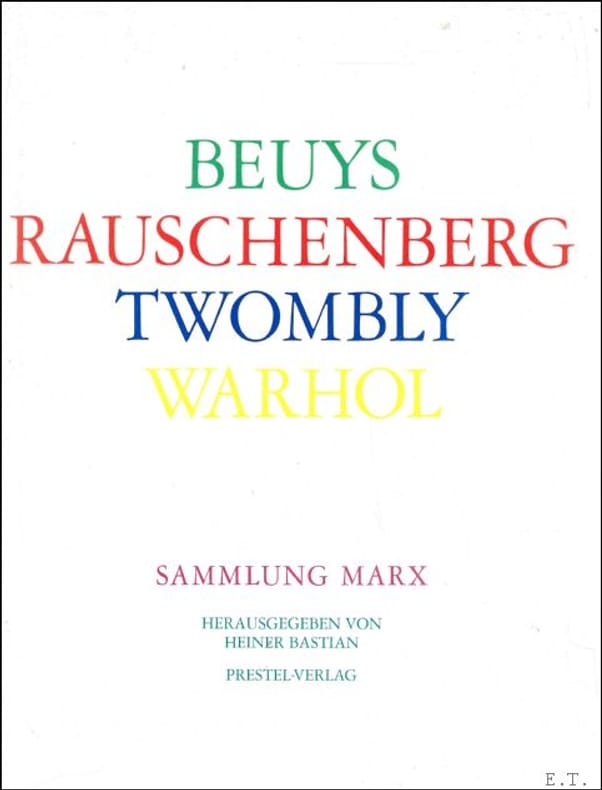
|
|
|
3rd Edition Larsen and Marx
Studyguide for an Introduction to Mathematical Statistics and Its Applications by Marx Larsen & ISBN 9780139223037
Paperback / softback. New. paperback
书商的参考编号 : A9781428814431 ???????? : 1428814434 9781428814431

|
|
|
[ANGLETERRE] - MARX (Roland) -
L'angleterre de 1914 à 1945.
Paris, Armand colin - cursus, 1993; in-8, 175 pp., broché. Broché en état moyen reliure un peu salis texte en bon état.
书商的参考编号 : 201508352
|
|
|
[ANGLETERRE] - MARX (Roland) -
L'angleterre de 1914 à 1945.
Paris, Armand colin - cursus, 1993; in-8, 175 pp., broché.
书商的参考编号 : 200917820
|
|
|
[BEAUX ARTS] - [MARX (Roger)].-
Catalogue des Estampes modernes composant la Collection Roger Marx, dont la vente par suite de décès aura lieu à Paris, Hotel Drouot, Salle n°7, du Lundi 27 avril au samedi 2 mai 1914 inclus. Commissaires-Priseurs : Me F. Lair-Dubreuil et Me Henri Baudoin. Expert : M. Loys Delteil.
P., Imprimerie Ch. Berger, 1914, in 4° broché, 102pp. ; 47 planches hors-texte ; rousseurs ; couverture défraichie et abimée ; exemplaire débroché.
书商的参考编号 : 21406
|
|